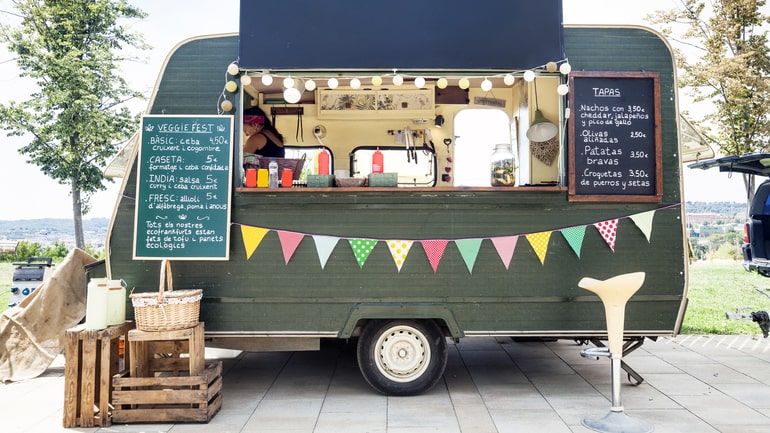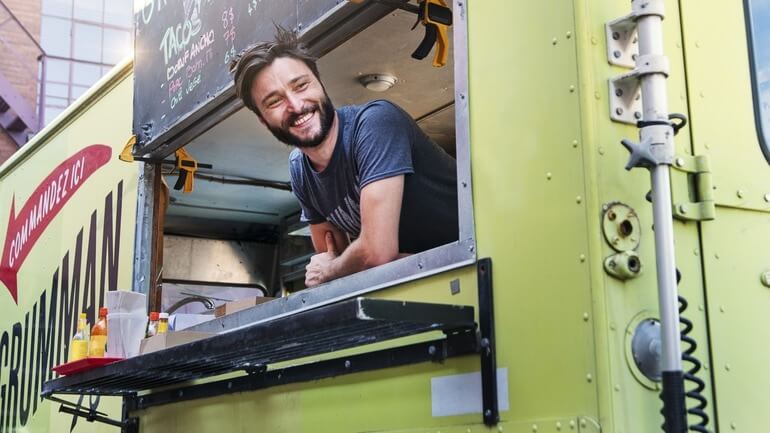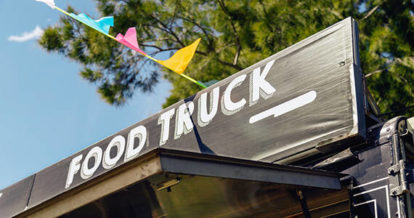Exploring how to start a food truck business is a smart move in 2025. The startup costs are lower than what you’d have to shell out to open a brick-and-mortar restaurant (or retail business), and mobile food trucks give you the flexibility to change your location on a dime.
The whole idea sounds pretty much perfect, doesn’t it? But before you start tossing around clever restaurant names and brainstorming food ideas, it’s essential to do your homework on the best food truck business model for you. Get the startup details right, and your truck window will be bustling in no time. In this guide to launching a food truck business, we’ll answer a few important questions:
- What do you need to run a food truck business?
- How much does it cost to start a food truck business?
- What are the 5 crucial steps to launching a food truck business?
The food truck life is calling and you’re about to heed the call – let’s start!
What Do You Need to Run a Food Truck Business?
Today, there’s no question food truck culture is going strong. Food trucks are a big hit with customers and their popularity is fueled by TV shows like The Great Food Truck Race, Food Truck Nation, and Food Truck Face Off.
But food trucks aren’t just a fun restaurant concept, they’re also a sound small business model. The market size of the U.S. food truck industry was estimated to be $1.48 billion in 2022 and is expected to only continue to grow.
Of course, running a food truck does come with its challenges and virtually every food truck owner will tell you that even the best food truck will encounter some speed bumps. Part of knowing how to start a food truck business includes rolling up your sleeves to do some administrative work – before you even get to the food. If you’ve ever wondered, “what do you need to run a food truck business?”, we’ve got the answers for everything from your food truck costs to how to accept credit cards as a mobile business.
1. Business Plan
Having a solid restaurant business plan is essential before you start any food truck business, whether you’re planning to seek startup capital or fund the venture yourself. In your business plan, cover important details such as what type of food you’ll serve, the truck (or trucks) you’ll be using, the kitchen setup, the local market, the staff you’ll hire, and your financial details.

Download this customizable restaurant business plan template to create a professional business plan for your new venture.
2. Licenses and Permits
The plan for your food truck business model is hot off the grill. Now it’s time to secure all the licenses and permits you’ll need to get up and running with your mobile business.
Every city and county has different rules around selling food from a food truck. Before you decide where your truck will be based, educate yourself on the necessary licenses and permits you’ll need in your chosen location – and anywhere you plan to take your truck to sell food. It’s important to know what you’re in for before you start a food truck business, rather than be surprised when you’re bogged down with applications for things like a food handler’s permit.
3. Truck
Once you’re legally able to operate a food truck business, you need some wheels! Do as much research as possible during this stage of learning how to start your food truck business. Reach out to other food truck owners, read as much as you can online, and talk to mechanics and people who know trucks. You don’t want to invest all of your time and money into a used truck that’ll spend more time broken down on the side of the highway than sitting pretty at a busy farmers’ market, so choose your food truck wisely.
4. Financing
When you factor in insurance, labor, truck maintenance, supplies, permits, and operations, the cost of opening and operating a food truck is nothing to sniff at. But don’t let that scare you off, because you don’t necessarily have to go it alone. You may be able to get some help with the operating costs and capital by securing financing for your mobile food truck venture, including restaurant equipment financing.

How Much Does It Cost to Start a Food Truck Business?
Now that we’ve addressed what you need to run a food truck business, it’s time to grab your calculator as we talk numbers and accounts.
Since nothing comes free, calculating your startup costs is crucial to starting a food truck business. To improve your chances of getting financing, try to project your specific costs as accurately as possible in your food truck business plan. You can gain a deeper understanding of these numbers by writing a detailed financial plan that includes the cost of the following line items.
Vehicle Costs
You could pay anywhere from $40,000 to $150,000 on average for a food truck, depending on whether it’s used or new. If you choose to buy a used truck, you should also account for the cost of potential repairs.
Licenses, Permits, and Certifications
Expect to pay about $28,000 for these startup and ongoing costs combined. These expenses will vary depending on where your food truck business is based.
Fuel
While $500 a month is typical for this kind of mobile business, your fuel costs could be much higher if you’re traveling frequently.
Insurance
Budget for about $540 a month in insurance costs, but keep in mind that this number will change based on where you’re located, how many employees you have, and what your annual revenue totals.
Food and Supplies
Before you purchase all your food, be sure to calculate food costs as a percentage of your total sales. The average range is between 20 and 40%. Additionally, kitchenware, a chalkboard menu, and a register could run you another $1,700 to $5,000.
Technology
Tech like a mobile POS system can cost anywhere from $150 to $2,500 for the hardware itself, and between $60 to $100 per month in ongoing software subscription fees. While this may seem like a big chunk of change, Investing in superior technology can make your life easier and help you save money in other areas of your business.
Staff
Before you hire a fleet of staff, keep in mind thatFood truck employee wages range from $8 to $15 per hour on average. You should also consider the cost of uniforms, which can run you about $1,000.
Total Food Truck Costs
All in, you’re looking at a minimum of roughly $70,000 in total one-time costs based on the above list – plus all of the ongoing monthly costs. On the higher end, you could be spending upwards of $185,000 if you have more expensive tastes.
How to Start Food Truck Business in 5 Steps
There’s no question that it takes a significant investment to launch a food truck. To help ensure your dreams become a reality, don’t skip any of the important steps involved in getting your mobile food truck business off the ground.
1. Research Your Target Market
There were more than 36,000 food truck businesses operating in the U.S. in 2022. With the popularity of the food truck business model, you need to know your local market well in terms of both people and place if you want your truck to be a success. For example, selling hearty BBQ brisket sandwiches will require a different food truck business model than selling vegetarian wraps and power juice.
It’s also imperative that you understand the parking options for your desired location, and do your research on the licenses and permits required in the area. All of this information will come in handy later when you create your food truck business plan and marketing plan.
Finally, don’t forget to check out your competition before you launch your food truck. Keep in mind that due to the mobile nature of the food truck business, your competition will probably change frequently. It’s still worth researching who has recently set up shop on your local streets to see what you’re up against and what gaps in the market you might be able to fill.
2. Choose a Food Truck Name, Concept, and Menu
When it comes to food truck names, you’ll want to be creative, catchy, and clear. Sound like a tall order? Here are a few basics to help simplify the process of coming up with the perfect food truck name:
- First, ensure your name is indicative of the type of food you’re planning to sell.
- Second, make the name easy to spell and pronounce.
- Third, ask your family and friends for feedback, and jot down a shortlist of your top choices.
Once you’ve landed on the perfect name, it’s time to define your concept and draft your menu.
Your concept should set your food truck’s brand apart from competitors (who you now know all about, thanks to your market research). Consider culinary trends in your local area, and of course, think about what foods you love to cook and eat. When your passion for your business shows, customers notice.
Keep in mind that your food truck menu will need to be small because you’ll be working in your condensed space with limited cooking staff and you’ll have little room for extra stock. Check out successful food trucks for concept and menu inspiration, like Nashville’s Grilled Cheeserie, which features a black and white truck wrap that evokes an image of piano keys.

3. Create a Food Truck Business Plan and Secure Proper Licenses and Permits
Your food truck business plan should include an executive summary (the pitch for your food truck), a description of the business (including what kind of food you’ll sell and who your ideal customer is), and a research-based analysis of your market. The plan will also need to cover how you’ll manage your food truck, what staff you plan to hire, how you’ll drive sales (pun intended), and how much you anticipate in startup costs. Finally, don’t forget to include how much revenue you estimate your food truck can generate.
Once you’ve drafted a solid business plan, you need to obtain a few licenses and permits so you can legally become operational. Here are a few standard items you’ll need to get a food truck license:
- Business license or vendor license: This state license registers your food truck as a business – congrats!
- Employer Identification Number: This federal identification number for your business replaces your personal social insurance number on forms and applications.
- Tax ID: This state permit enables you to collect sales tax, and make bulk or wholesale purchases for your food truck.
- Parking: Local laws dictate where you can park your food truck, so be sure to check these out, obtain all necessary permits, and be prepared to pay for parking.
4. Purchase, Insure, and Outfit Your Food Truck
You have a few options when it comes to getting a food truck: buy a new truck and kitchen, buy a used truck and new kitchen, buy a used truck and kitchen, lease a food truck, or even rent one. As mentioned earlier, these costs can vary widely, so weigh the pros and cons of each approach and think about how your food truck business might evolve in the future. You’ll also need to get insurance, and learn what it will and won’t cover for your food truck business.
In addition to purchasing a truck, you’ll also need to consider food truck design to make the space work for you and your business. This includes determining your commercial kitchen layout and getting a snazzy mobile vehicle wrap for the outside of the truck to show off your branding. If your cooking space is limited, you can also space in a commissary kitchen.
Don’t forget about making sales, either. It’s best to have a hybrid POS software and hardware that allows you to accept credit cards anytime – even when you’re offline. This is important because food trucks don’t always have a reliable internet connection the way other restaurants do, and you want to make sure customers can still pay with credit when you have spotty WiFi.
5. Market Your Food Truck
Aside from your menu, creating your food truck marketing plan is another area where you can have a ton of fun with this business. You’ll need an eye-catching, mobile-friendly website to draw in potential customers, and a social media marketing plan to spread the word about your food truck and engage with fans. You’ll also want to think about which events and festivals (local or otherwise) you’d like to have a presence at to sell your food.
Looking at how other food trucks market themselves is the best way to get ideas for what you can do to build your own brand. One example of a food truck that has marketed itself well is Mac Mart, which has evolved from its humble beginnings in 2013 to a $1.5 million business with a ton of media attention to its name – all of which has helped increase brand awareness.

Need to get the word out about your food truck?
Who knew something as small as a food truck business could be so complex? But like most things in life that are challenging, it’s totally worth it to get to be your own boss, share your best food, and rev that food truck engine for new adventures on the regular. Most importantly, remember to enjoy the ride.
Free job application template for restaurants
Sign up for our free weekly TouchBistro Newsletter







